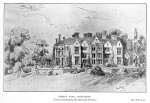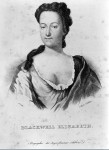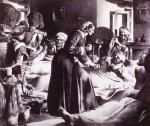 Florence Nightingale wasn’t even 18 years old when she first realized the expected life of an elegant young woman of her milieu — husband, children, charitable causes — was not for her. One of two much-loved daughters of wealthy, upper class parents, Florence grew up at Embley Park in Hampshire, spending the summers in the manor house of Lea Hurst on her father’s estate in Derbyshire. Her parents had progressive views of women’s education, and both Nightingale daughters received a thorough classical education from their Cambridge-graduate father William. On February 7th, 1837, at Embley, Florence felt “God called her to His service.”
Florence Nightingale wasn’t even 18 years old when she first realized the expected life of an elegant young woman of her milieu — husband, children, charitable causes — was not for her. One of two much-loved daughters of wealthy, upper class parents, Florence grew up at Embley Park in Hampshire, spending the summers in the manor house of Lea Hurst on her father’s estate in Derbyshire. Her parents had progressive views of women’s education, and both Nightingale daughters received a thorough classical education from their Cambridge-graduate father William. On February 7th, 1837, at Embley, Florence felt “God called her to His service.”
 What form this service would take she wouldn’t know for some years, but at least by 1844, nursing was on her mind. American poet and author of The Battle Hymn of the Republic Julia Ward Howe recalled that while she and her husband Dr. Samuel Gridley Howe were visiting the Nightingales at Embley that year, Florence asked Dr. Howe, “If I should determine to study nursing, and to devote my life to that profession, do you think it would be a dreadful thing?” He replied that it would be a good thing, a response that buoyed her hopes.
What form this service would take she wouldn’t know for some years, but at least by 1844, nursing was on her mind. American poet and author of The Battle Hymn of the Republic Julia Ward Howe recalled that while she and her husband Dr. Samuel Gridley Howe were visiting the Nightingales at Embley that year, Florence asked Dr. Howe, “If I should determine to study nursing, and to devote my life to that profession, do you think it would be a dreadful thing?” He replied that it would be a good thing, a response that buoyed her hopes.
She began to plan in secret to pursue her vocation. The plan was to learn the job by working as a nurse at Salisbury Hospital for a few months and then come home and display her newly acquired skills to such great advantage caring for the sick and destitute in the local village of West Wellow that any doubts her family might harbor would be instantly dispelled.
She didn’t even make it to the first step. Her mother was so horrified by the idea of Florence working as a nurse in a hospital that the plan was stillborn. It wasn’t the gross aspects of the job that so terrified Mrs. Nightingale. Disease, exposed body parts, gruesome operations, rivers of blood paled in comparison to the sexual shenanigans doctors and nurses were reputed to indulge in on hospital wards. Nurses were widely seen as little more than doctors’ paid mistresses.
 To her parents’ credit, they both looked into the idea, contacting their many friends in the medical profession to ask their opinions. William Nightingale even argued Florence’s case in correspondence with a doctor friend, but the responses were uniformly negative. Nursing was no job for a moral, religiously devout, rich, attractive, highly educated and marriageable gentlewoman. Even pioneering female physician Dr. Elizabeth Blackwell told Florence that a young lady she knew decided the only way for her to be taken seriously as a nurse without being assumed to be some doctor’s side-piece was to dress in pantaloons, cut her hair short and hope her deep voice kept the wolves at bay. A head nurse in a London hospital told Florence “she had never known a nurse who was not drunken, and that there was immoral conduct practised in the very wards, of which she gave me some awful examples.”
To her parents’ credit, they both looked into the idea, contacting their many friends in the medical profession to ask their opinions. William Nightingale even argued Florence’s case in correspondence with a doctor friend, but the responses were uniformly negative. Nursing was no job for a moral, religiously devout, rich, attractive, highly educated and marriageable gentlewoman. Even pioneering female physician Dr. Elizabeth Blackwell told Florence that a young lady she knew decided the only way for her to be taken seriously as a nurse without being assumed to be some doctor’s side-piece was to dress in pantaloons, cut her hair short and hope her deep voice kept the wolves at bay. A head nurse in a London hospital told Florence “she had never known a nurse who was not drunken, and that there was immoral conduct practised in the very wards, of which she gave me some awful examples.”
Florence was passionately opposed to the life expected of her. She felt her calling to the marrow of her being. She wanted to be a “savior” in God’s name, for her existence to have a profound purpose. The Nightingales hoped some travel might distract their determined daughter, maybe even inspire her to follow her many intellectual pursuits instead of nursing. In 1847, Florence was sent to Rome with some friends of the family. She loved it, but as soon as she returned to London in 1849, she found work inspecting hospitals and working at schools for poor children.
 And so the prospect of more foreign travel was dangled before her. This time her father was sending her, again with friends of the family, to Egypt and Greece. Again she loved it. On her trip to Egypt in 1850, she picked up several easily transported figurines as souvenirs. They were not fancy things, and as a group she had a rather low opinion of them, but there were some she really liked. She wrote to her sister Parthenope:
And so the prospect of more foreign travel was dangled before her. This time her father was sending her, again with friends of the family, to Egypt and Greece. Again she loved it. On her trip to Egypt in 1850, she picked up several easily transported figurines as souvenirs. They were not fancy things, and as a group she had a rather low opinion of them, but there were some she really liked. She wrote to her sister Parthenope:
As for the Egyptian rubbish, you may do just what you like with it, keep it or give it away. There is nothing that reminds me of what I have seen, nothing that savours of my Karnak except the bronze dog, the brick seals which sealed the tombs at Thebes, and the four little seals in the light box … you don’t know how difficult it is to get anything at Cairo – for I know you will think, and very truly, what I have sent home very shabby.
 Parthenope kept them, and they remained in the family for almost a century. The last owner was Rosalind Nash, daughter of Florence’s cousin and her close friend and confidante. In 1949, she donated the group to what is now the National Museums Liverpool. On April 28th, they will go on display for the first time in Liverpool World Museum’s new Egyptian gallery, home to the second largest collection of Egyptian antiquities in the UK (the British Museum has the largest).
Parthenope kept them, and they remained in the family for almost a century. The last owner was Rosalind Nash, daughter of Florence’s cousin and her close friend and confidante. In 1949, she donated the group to what is now the National Museums Liverpool. On April 28th, they will go on display for the first time in Liverpool World Museum’s new Egyptian gallery, home to the second largest collection of Egyptian antiquities in the UK (the British Museum has the largest).
Ashley Cooke, the senior curator of antiquities at the World Museum, is delighted to display her amulets at last. They included four to the protective goddess Taweret, particularly cherished by women during childbirth.
“What she brought back is fascinating to us, but I think she expected to be offered ancient treasures and she was very disappointed with what was available,” he said. “Ironically we are displaying some of the objects which she did rate and was very pleased at getting hold of – which have turned out, alas, to be fakes.” […]
In a later letter she mentioned the most precious of her seals again: “I possess an antiquity though which I really do value, an official seal, of the time of Rameses the Great, my hero, with his cartouche upon it. An undoubted reality. Who will dare to open letters sealed with the great Rameses’ own seal?”
Cooke said kindly: “Unfortunately the four little seals are all forgeries but at least they gave her some pleasure and they are quite pretty little things.”
 Not even all the wonders, fake or real, of Egypt could keep Florence from achieving her goal. Five years after her trip to Egypt, Florence Nightingale went to tend to the wounded of the Crimean War, and the rest, as they say, is history. Her role in the war may have been overstated in hindsight, but her struggle against societal disapproval to even get a chance at nursing played an essential role in her many great accomplishments after her experience in the Crimea. She built nursing into a profession with standards of care and commitment, founded the first secular nursing school and advocated tirelessly for improving healthcare for people of all social strata.
Not even all the wonders, fake or real, of Egypt could keep Florence from achieving her goal. Five years after her trip to Egypt, Florence Nightingale went to tend to the wounded of the Crimean War, and the rest, as they say, is history. Her role in the war may have been overstated in hindsight, but her struggle against societal disapproval to even get a chance at nursing played an essential role in her many great accomplishments after her experience in the Crimea. She built nursing into a profession with standards of care and commitment, founded the first secular nursing school and advocated tirelessly for improving healthcare for people of all social strata.
When I was a little’n, the great heroines were Flo Nightingale, Grace Darling and Flora MacDonald, though the latter was a heroine in an unworthy cause. Which was rather the point of having her on the list, I expect.
Hm, have I missed anyone off the list? Joan of Arc was mentioned, but with the reservation (I think) that she was widely assumed to be bonkers.
livius drusis
I am a friend (from YSN) of your mother who alerted me to your blog. Interesting article on FN and her treasures! Thank you for blogging about one of nursing’s heroines.
I’m sorry, did Florence have an actual owl or is that a doll or statue of some sort?!?!?!?
Just to point out that in this interesting article your picture is the wrong Elizabeth Blackwell: this is the botanist and herbalist who died in 1758, not the physician.